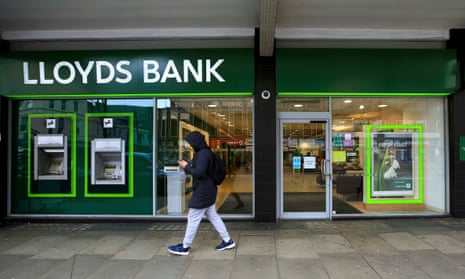High street banks are preparing to set out how they will respond to the interest rate cuts likely to be sparked by the Brexit vote, amid expectations it could pressure them to cut jobs and earmark more branches for closure.
Lloyds Banking Group, in which taxpayers have a 9% stake, is facing questions from the City about any plans to step up its cost-cutting measures. This is because it is more closely linked to the UK economy than rivals with international operations.
The bank has embarked on a programme to cut £1bn from costs in the three years to 2017, which already involves 9,000 job cuts and 200 branch closures. There are expectations that this will be accelerated.
The bailed-out bank is among a number of high street banks reporting their results this week. Barclays and Virgin Money are also publishing their six-month figures at a time when bank share prices have been pummelled in the wake of the vote to leave the EU. The following week HSBC, Standard Chartered and the 73% taxpayer-owned Royal Bank of Scotland will report their trading for the first six months of 2016.
But analysts are more interested in banks’ reaction to the EU vote, which could have a dramatic impact on the domestically focused banks if the economy slows and bad debts – or impairment charges – rise. Expectations are also mounting that the Bank of England will cut interest rates from an already historic low of 0.5% on 4 August, which will put pressure on bank profits.
Analysts at Morgan Stanley said: “We think the focus will be updates to guidance for core UK earnings post-referendum. We cut domestic UK banking earnings [by approximately] 20% post the vote as we expect margin pressure, lower loan growth and normalisation in impairment trends.”
Gary Greenwood, an analyst at Shore Capital, said it would be difficult for banks to provide a clear outlook statement. “We might get more announcements around cost-cutting,” he said. “The reasons why Lloyds could be aggressive on costs is their margins are being squeezed on low interest rates.”
Approximately 45,000 roles had already gone at Lloyds since HBOS was rescued in 2008, before the latest round of cuts, and the workforce has fallen to about 75,000. In February, at the time of its results for 2015, Lloyds said it was ahead of its October 2014 plan to cut costs but provided no further detail.
Analysts will be waiting to see if António Horta-Osório, the chief executive, can decide how to wring further costs out of the business, which also owns Halifax. Lloyds would not comment on expectations of cost-cutting measures.
Analysts at Deutsche Bank: “Given the more difficult revenue environment we expect questions to management on potential further cost rationalisation.”
The government has put on hold its plans to sell shares to the public and the views of the chancellor, Philip Hammond, on such a share offering are unclear. Its shares closed on Friday at 55.5p – below the 73.6p at which taxpayers break even on their stake – and amid expectations that plans for major dividends could be delayed.
At Barclays, which will report on Friday, its new chief executive, Jes Staley, will face questions about the bank’s growth prospects and progress on selling its African arm.
It is a crunch week for banks across Europe as the results of stress tests on EU banks, including those in the UK, are published by the pan-European banking regulator on Friday.
The European Banking Authority is not issuing a pass or fail on the results, which are being announced while the focus is on Italian banks and the possibility they will need to raise more capital.
Analysts at Credit Suisse said that a “shallow recession is already priced in” for bank shares on stock markets across Europe. They added: “The EBA test could be a positive market event, showing the sector has improved its ability to withstand economic shocks.”

Comments (…)
Sign in or create your Guardian account to join the discussion